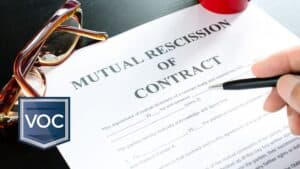For those that have bought a timeshare, the ownership experience can carry quite the mixed bag of emotions. People either enjoy it or they regret the decision. Truth be told, it all starts with the sales presentation. When buyers are fully aware of all the purchase entails, it makes it easier to find contentment. But when they’re sold on false hopes, then higher costs and minimal availability, regret tends to be the result. When a salesman from the timeshare lies about the reality of the product while leaving out pertinent information about the contract, buyers feel rather forsaken to say the least.
When you think about it, buying a timeshare is no different than any other large purchase. An informed decision that matches expectations will be a satisfactory one. An expensive, impulse decision that was too good to be true would leave a bad taste in anyone’s mouth. While it’s never a good idea to make an uninformed purchase of this magnitude (interest, fees and mortgage usually exceeds $40K), it’s hard to fault the consumer when the timeshare lies.
Misleading Consumers is Extremely Damaging.
When a retailer has the ability to lock uneducated buyers into perpetual (lifetime) agreements, a higher level of responsibility needs to be expected. If the travel opportunity is so great, then selling people on the concept shouldn’t be difficult. You shouldn’t need to lie or hide details in order to close a deal. Some people have no business owning a weekly timeshare interval. The simple fact that consumers are pressured into buying something they’re not even seeking out – for a misleading price – is downright criminal.
One unexpected expense can easily push most people over their budget and into financial hardship. So in order to help them avoid haste, we thought it was a good idea to break down four ways timeshare companies convince potential customers with lies. If you’re not aware of the strategy behind this, you could be easily swayed into a disastrous situation. No matter what the resort tells you, the signed contract terms are the only thing they’re legally bound to. Broken promises happen frequently here and if you’re unaware of common timeshare lies, misconduct is extremely difficult to prove.

Why Lies About Timeshare Travel are Common.
Timeshare sales teams know that once the rescission period (a trial period that lasts 5-7 days in most states) is over, new owners are officially bound to whatever they signed that was in writing. Any undocumented guarantees, hypothetical scenarios or suggested possibilities cease to exist. This gives customer service teams a chance to position up-sales as solutions. When the timeshare salesperson lies and the owner can’t prove it, they’re often forced to spend more money just to make the purchase worth it.
When they can’t use the property the way they envisioned, many find themselves at the mercy of the resort. It’s hard for them to say “No” even when they don’t have the money because thousands of dollars are already going to waste. Pride and hope often gets in the way here. So, preventing a bad decision starts with asking the right questions. Once you know how and why the salesman of a timeshare lies to you, it’ll be easier for you to identify deceit, confidently say “no” and walk away. Hopefully this article equips you to act accordingly.
Lie #1: Cheap Travel Options Are Available.
When it comes to assessing the sales strategies in the timeshare marketplace, the ideal target audience is pretty clear. Resorts usually crave to speak to those who rarely even think about traveling or lavish vacations. These groups of people tend to be 35 and older with an average annual income of $50K. Most of which aren’t privy to the history of timeshare travel and don’t have a lot of extra funds laying around for a nice family vacation every year.
So why do they target people with limited funds and zero travel aspirations? Because the timeshare lies about the product being an affordable, once-in-a-lifetime opportunity that isn’t actually out of reach. They know how to make it seem like it’s a deal not worth passing up by leaving out potential limitations, costs and fees. But first, they have to gain their victim’s trust by showing them a smashing good time.

Creating Appeal Before the Deal
Every year, timeshare companies advertise free gifts in order to lure hundreds of thousands of ideal customers to their destination resorts. The only thing they require is that each guest attends (or endures) a “brief” timeshare presentation. Wining and dining consumers that rarely experience a pampered lifestyle creates an uncommon sense of euphoria.
This opens a consumer’s mind to possibilities. It’s like getting your spouse drunk to elicit a reaction that benefits you. By the time attendees are told an affordable getaway is at their fingertips, the excitement of the new experience blinds them from their intuition. In the midst of bliss, escaping for a week all of a sudden becomes appealing.
Undisclosed Dollar Amounts.
In reality, buying a timeshare is rarely what it seems. Far too many people end up finding this out the hard way. During the sale, specific number amounts are normally highlighted or pointed out in order to mislead the buyer. What tends to be left out are annual maintenance fees, potential special assessments, interest and even taxes. What was said to be $359/month all of a sudden becomes $525/month after the first year is all said and done. That’s $6,500 and an unknown liability cost for mediocre accommodations for a week. Does that sound like an affordable travel alternative to you? Since maintenance fees rise every year and special assessments are spontaneous, there’s no telling how much the overall cost will be.
When the purchase sends a buyer into financial hardship, additional costs and penalties can devastate their livelihood. Something that was sold as a way to bring the family closer together can end up tearing them apart. Even if the timeshare lies and claims the total cost won’t exceed $19K, most vacation owners end up paying close to $41K by the time they’re repayment term ends. This is assuming all payments were made on time. It also doesn’t consider the simple fact buyers are on the hook for maintenance and assessment costs for life. So, the true “all in cost” (at maturity) is closer to $56K.
Timeshare Lies Prove to be Costly.
When it’s all said and done, forking over six figures for an annual trip isn’t unrealistic. Even for a median income household. This is crazy to think when far cheaper options are available. If buyers knew the cost would play out this way, it’s safe to say most would have walked away. But since they were told they could afford it and lied to about the financial commitment, many are forced to adapt to a financially handicapped situation. All for the sake of a few thousand dollars in commissions paid to a sales representative with no conscience.

Lie #2: Timeshares Are Investment Opportunities.
Since we’ve discussed this a number of times in other articles, we’re going to keep this short and to the point. A timeshare is not an asset, it’s a liability. Think of it like leasing a car. You can’t resell the vehicle and it’s only costing you money to use it. There isn’t much that’s advantageous about it from an investor’s standpoint. The fact of the matter is, timeshares hold zero resale value – now and in the foreseeable future. If anything, they’re depreciating faster than ever before due to improved travel options and other advancements that the timeshare industry is failing to adapt to.
Buying a vacation interval isn’t even comparable to the purchase of a new car that depreciates when you drive it off the lot. It never carries any value. The market is so dense and competitive that it’s nearly impossible to ever even get in front of someone looking to rent or buy one. So when the timeshare lies and mentions resale or rental as a fallback or investment option, don’t believe it. A weekly interval should never be mistaken for a business opportunity.
Supplemental Pipe Dreams.
The resort wants you to believe that the more you buy the more you’ll be able to make. The low risk, high reward sales pitch works when people think they can earn supplemental income while vacationing for free. Especially those with limited incomes and not a lot of spare change. It’s extremely appealing to them and often used to combat their initial remorse. But a mediocre interval during a limited week will never be able to compete with timeshare marketing strategies or premium vacation homes that are visibly listed on AirBnB or similar.

Lie #3: Booking Priority and Convenient Availability.
One of the biggest lies timeshare companies tell involves availability. Nearly every day, we talk to someone that was told a specific week or destination was going to be available and it wasn’t. It’s just another way sales teams use verbal affirmations to get people to sign the dotted line. Buyers that are on the fence about the purchase usually want certain guarantees before agreeing to the deal. When they’re able to lock in a date that the entire family would appreciate, the pot becomes too sweet to pass up.
But the Actual Deal is Usually Sour.
In reality, first dibs for bookings almost always go to third party online travel retailers like Expedia and Priceline. Although new owners may have been led to believe they had priority booking, it’s highly unlikely. You’d have to make a substantial investment to guarantee a specific date – at which point you are drastically overpaying for something you can reserve through one of the aforementioned third parties. Resorts profit far more from retail travelers during peak seasons. They’re not going to hand over these dates to clients that are already obligated to pay.
If the buyer doesn’t figure this out within the first week, the trial period will end and they’ll be stuck with limited dates and destinations for good. Misleading statements and guarantees about availability can really put a damper on the entire experience for the consumer. Especially when the scheduling department for the timeshare lies further by claiming another vacation owner booked the week first. Ironically, this sets the resort up nicely to pitch an upgrade for the desired dates.

Lie #4: “Beneficial Interests” Add to the Family Legacy.
If you stay at a timeshare presentation long enough, sales teams know how to start tugging on your heart strings. After a few hours they start trying to make attendees feel as though they’re letting loved ones down by passing up an amazing opportunity they may never come across again. Whether they’re referring to children, extended family members or a close group of friends; the timeshare company knows how to pull information out of you and use it against you.
A Legacy Pitch is a Red Flag.
Telling a proud father that his kids deserve an annual trip is a good way to chip away at the sale. One of the more famous ways they go about doing this is what’s called a “legacy pitch.” This leads potential buyers to believe they’ll be able to leave their kids a piece of vacation property (otherwise known as “beneficial interest”) for future use once they pass away. This tends to be pretty convincing for aging couples nearing the end of their lives.
Unfortunately, it’s just another way the timeshare lies about the actualities of the bargain. While the offer is normally sold as a points program through a trust, in most cases, the contract language states the owner doesn’t actually own anything at all. The trust owned by the timeshare does. However, the owner is on the hook for the mortgage, maintenance and assessment fees. What ends up happening is, the children of the deceased buyer end up absorbing the burden down the road and the resort begins requesting liability payments from them.

Avoid the Lies and Focus on the Facts.
At the end of the day, the only reason a timeshare should be purchased is for the travel experience. However, participating in minimal research and simple comparisons will show this to be a poor financial decision. While the purchase is sold as an affordable expedition with ideal dates that are too good to pass up – you must understand that you’re paying a premium to vacation this way. Nothing is guaranteed unless it is in writing. If you feel as though your emotions and personal relationships are being used to leverage your decision, it’s always best to walk away.
The truth is, it’s very hard to identify timeshare lies and deception at the point of sale. But when you know what to ask and how to confirm pertinent details, you’ll always be able to make a confident decision. The last thing you should want is to enter a never-ending sales cycle that continues to prey on your desperation with false hopes. If you’re stuck in an unfavorable agreement, we’d love to help you exhaust your options with the resort before helping you find a favorable outcome. We provide free consultations that explain how to get out of a timeshare or you can begin the qualification process below.







One Response
I wish I read this article two years ago! We lost $15,000 and now own a worthless timeshare. Every single lie that you wrote about was told to us. We even told the saleswoman that we don’t take that many vacations and she responded with “now you can, ” as if all these vacation spots were available. We found out how difficult it is to book. This should be illegal but everyday, people are being sold timeshares. I can’t understand how they keep selling these burdens to unaware consumers but they won’t resell ours. I could have done so much with that money! How could I be so stupid? How do I earn others?